Recalling Social Welfare’s ‘Finest Moment’ After Los Angeles erupted in racially charged violence 30 years ago, UCLA faculty and students gave people in a city under siege the chance to talk
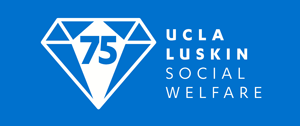
By Les Dunseith and Stan Paul
In 1992, four police officers were acquitted in the beating of a Black man, Rodney King, whose brutal arrest had been caught on camera. Pent-up fury from years of racial and economic inequality in Los Angeles spilled onto the streets in waves of burning, looting and violence that lasted three days and left 45 people dead.
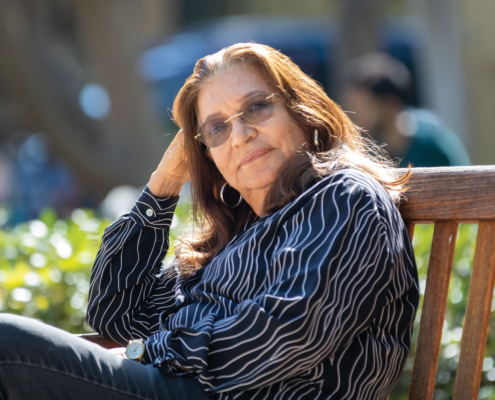
Distinguished Professor Emerita Rosina Becerra was dean of the School of Social Work at UCLA in 1992. Photo by Les Dunseith
Rosina Becerra was dean of UCLA Social Welfare at the time. Joe Nunn and Alfreda Iglehart were on the faculty. Laura Alongi was in her early 20s and a second-year master’s student studying to be a social worker.
What they and others did next was “perhaps our finest moment,” said Nunn, who like Becerra and Iglehart is now a professor emeritus at the Luskin School of Public Affairs.
“There were people who were afraid to leave their houses,” Becerra remembered. “A lot of people were unable to figure out where to get services. They didn’t know who to call.”
Within days of the uprising, officials at Los Angeles’ public television station, KCET, reached out seeking advice through Mitch Maki, a field faculty member at the time whose wife was a station employee. Becerra recalls sitting at a conference table with Maki and station employees eager to assist but unsure how to respond to people’s emotional turmoil. What did people need?
“Mostly, they need a chance to talk,” Becerra told them.
Three days later, UCLA Social Welfare and KCET-TV launched a crisis line during which faculty, students and other volunteers recruited by UCLA answered calls from distressed citizens via the telephones normally used during the station’s pledge drives. They called it, “A Chance to Talk: Emotional Support in Times of Crisis.”
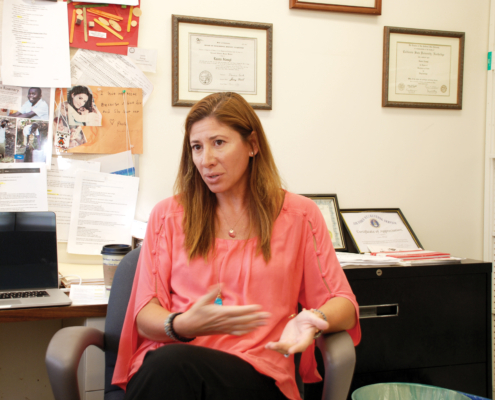
Field faculty member Laura Alongi was a student in 1992. UCLA Luskin file photo
Alongi was one of the student volunteers, helping to fill weekday shifts that ran for four hours each morning and four more in the evenings, plus 8 a.m. to 11 p.m. on weekends. While the crisis line was in operation, KCET viewers were encouraged by news anchor Val Zavala to call a number shown on their screens if they needed to talk to one of the people working the phones behind her.
Because of the urgency of the situation, volunteers like Alongi only had time for a brief orientation. She had never worked a crisis hotline. Moving about the city to get to the TV studio still felt dangerous. And racial tensions remained high, especially between Black residents and the Korean shop owners whose properties had been a frequent target of rioters.
Alongi remembers being filled with anxiety.
“Is this something I should be doing?” she worried. “Do I even have the right to do this, given that I’m, you know, a young white woman and not impacted in the same way?”
Her anxiety was replaced by a sense of fulfillment once she began taking calls.
“It was fantastic,” said Alongi, now a member of UCLA Social Welfare’s field faculty herself. “The people I spoke to were all just afraid and hurt and sad. They wanted to be able to talk about that with another human being.”
Alongi recalled speaking with an older woman who lived in South Los Angeles near where the unrest began.
“She was crying. And she said, ‘How did it get to this? How did we end up being these people that fight each other in this way?’”
Some calls involved directing people to services. One caller said her market had burned down and she didn’t know where to go now for food. But mostly, Alongi said, she was there just to listen.
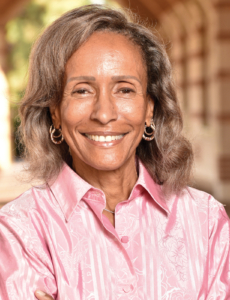
Professor Emerita Alfreda Iglehart helped organize the crisis hotline after the civil unrest.
“We didn’t know what to expect,” said Iglehart, who helped organize the effort and later contributed to an academic paper about it. “And you did have some angry callers.”
Volunteers were instructed to remain calm, Becerra said. “No matter what anyone ever said to you, you’re not to get mad.”
Later analysis showed the initial reason for most calls were feelings of anger and frustration (22%), followed by fear or anxiety (19%) and a desire to discuss the current situation (11%).
About 4% of the calls were racist and hateful in nature. Although relatively small in number, these calls were powerful and ended up occupying a disproportionate amount of debriefing time afterward, researchers noted.
The academic report details an incident in which a Black female volunteer received a call from an angry white male who made racist and disparaging remarks regarding African Americans.
“Both caller and listener were aware of each other’s ethnicity, and the call proceeded to last about half an hour,” according to the report, which was written by Iglehart, Nunn and Maki, with contributions from Cayleen Nakamura at KCET. “The listener validated the caller’s underlying personal feelings and carefully challenged him to reframe his thinking. The caller ended the call by stating that he realized that he had said some hurtful things, acknowledged that the listener had stuck with him, and thanked her.”
The report also mentions other callers:
- a man who was despondent over the destruction of his business said he contemplated suicide;
- a 10-year-old boy found it unfair that he could not go out and play because of the unrest;
- an elderly woman spoke of her fear of waiting at bus stops;
- a 7-year-old girl called to say that she was having problems sleeping because of thoughts that “the riots will happen again.”
“We validated people feelings if they were fearful. If they felt alone, we validated that,” Iglehart said. “We wanted people to feel that what you are going through and what you’re experiencing is not unique to you. Other people around you are feeling this way.”
Given the cultural diversity of Los Angeles and the randomness of calls, listeners fluent in Spanish, Korean
and several other languages were always present.
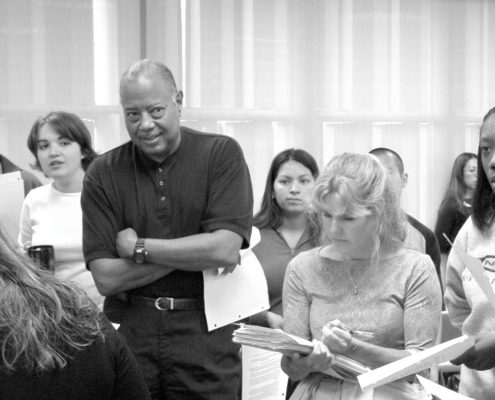
Professor Emeritus Joe Nunn participated in the crisis hotline and says it exemplified the ideals of social work education at UCLA.
“When people would call in, if they spoke Spanish or they spoke Tagalog or whatever language, you’d hold up a sign that said you needed someone with that language skill to come over,” Nunn said.
The crisis line started with UCLA faculty and students, but it soon expanded.
“There is a great deal of credibility that goes with the UCLA name,” Iglehart said. “With that kind of credibility and legitimacy, people say, ‘Oh, this must be a good idea. I want to be involved.’”
Soon, organizers had mobilized their contacts and recruited local professionals in the helping professions and additional student volunteers from other L.A.-area universities. In all, more than 300 volunteers took calls from about 2,000 individuals. By the 10th day of the project, the Los Angeles County Department of Mental Health had established its own telephone hotline, and the UCLA-KCET project was terminated.
For those involved, the effort remains a treasured memory that exemplifies UCLA Social Welfare’s long history and tradition of providing service to Southern California.
“We’re in a university where we talk about teaching, our research and service,” said Iglehart, noting that in academia that tends to mean service to the profession, such as reviewing articles for an academic journal. “This was direct hands-on service to the community of Southern California, and I think that’s really important.”
“People from my student cohort went out onto the streets and were doing cleanup after the fires and the looting,” Alongi said. “Just literally sweeping up broken glass.”
They had listened and they had acted, doing whatever they could to help a fractured city begin to piece itself back together.

